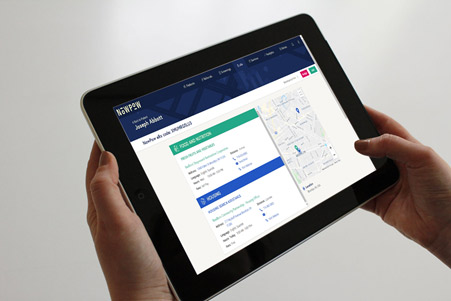OneCity Health, the NYC Health + Hospitals Performing Provider System under New York State’s Delivery System Reform Incentive Payment (DSRIP) program, today announced the launch of two new programs to address food and housing insecurities among patients of the City’s public health system. The Food and Nutrition Service Networks and Housing Navigation Network will connect patients to available services that are traditionally fragmented and difficult to navigate. Three lead community-based organizations (CBOs), BronxWorks, Public Health Solutions (PHS) and RiseBoro, will be awarded a total of $4.3 million to organize a network of 26 smaller CBOs to assist with outreach and referrals to available services, such as Safe Haven beds and eviction prevention services for those facing housing insecurities, and food pantries and SNAP enrollment for those facing nutrition challenges. The contracts will run through December 2020.
“OneCity Health is bringing health centers and community partners together to provide services that can address whole-person care as part of our ongoing effort to transform the health care delivery system under DSRIP,” said CEO of OneCity Health and Vice President of NYC Health + Hospitals Israel Rocha. “By helping patients access and more easily navigate resources like affordable foods or housing, we can create a seamless experience for patients to address both their clinical and social needs. A critical part of the DSRIP program has been building the underlying infrastructure that can facilitate these connections and get patients to the right resources.”
“It’s exciting to expand our partnership with OneCity Health and NYC Health + Hospitals to support new innovative programs that will immediately impact many New Yorkers and continue to gather knowledge about community referral outcomes to inform future investments and policies,” said NowPow CEO Rachel Kohler. “We are proud to see our platform being used to bring communities together to foster stronger collaborations and better care.”
A housing and/or food navigator from one of the 26 CBOs will be stationed in all 11 NYC Health + Hospitals acute-care facilities and NYC Health + Hospitals/Gotham Health, Belvis and Morissiana, where they will receive patient referrals from on-site social workers and clinical teams. The patients will be screened to assess for housing instability, food insecurity, and other social service needs. Navigators will use a standard form to determine a patient’s need.

Utilizing NowPow, a social service directory and referral platform, navigators will check for eligibility and then match and connect patients with the community resources that can best meet their identified needs. NowPow allows the navigator to identify these community resources. The housing and food navigators will also have information tables set up at the facilities where patients can self-refer.
OneCity Health awarded funding to the following lead CBOs:
Lead Organization: BronxWorks
Focus: Housing
Budget: $247,500
BronxWorks will lead the Bronx housing navigation services, which will include helping housing insecure individuals access mobile vans that will take them to Safe Haven beds. BronxWorks will ensure that the individuals remain connected to their shelter designation.
Lead Organization: Public Health Solutions (PHS)
Focus: Food
Budget: $2,652,841
PHS will deploy its Food and Nutrition Service Bundle (FNS Bundle) model and will offer Stanford Diabetes Self-Management classes in NYC Health + Hospitals facilities in the Bronx, Manhattan, and Queens. The FNS Bundle program offers screening and navigation to community food and nutrition resources for food insecure patients and connects them with more than one resource, including SNAP, WIC, medically tailored home-delivered meals, food pantries, congregate meals, individual and group nutrition counseling, and sources of fresh produce. The Stanford Diabetes Self-Management program (DSMP) is an evidence-based six-week group program for people with type-2 diabetes. It provides information and skills to individuals so that they can manage their diabetes symptoms. PHS will organize a network of 12 CBOs to conduct outreach and handle referrals.
Lead Organization: RiseBoro
Focus: Food and housing
Budget: $1,431,483
RiseBoro will lead efforts in both food and nutrition, as well as lead the Brooklyn housing navigation. Clients will have access to cooking classes, farm shares and the diabetes self-management classes to help address challenges with food and nutrition access. RiseBoro housing navigators will focus on individuals who are housing insecure or who may have fallen behind in their rent payments. RiseBoro will also connect individuals to providers who can help them complete applications for permanent affordable housing placements. RiseBoro will organize a network of 13 CBOs to conduct outreach and handle referrals.
Approximately 5,500 New Yorkers will be connected to food and nutrition services, while an additional 420 will receive assistance accessing housing services through these partnerships.
The NowPow web-based social directory will help navigators search for services that meet the cultural and linguistic needs of NYC Health + Hospitals’ patients referred for housing and/or nutrition support services. Through NowPow’s tracking and evaluation functions, navigators will know if their client received the service and follow up appropriately depending on the circumstance.
“Interrupting the cycle of food insecurity is essential to uplift New Yorkers in need, and our NYC Health + Hospitals facilities provide an optimal setting to reach those who need support,” said Director of the Mayor’s Office of Food Policy Kate MacKenzie. “This effort with community partners will connect New Yorkers to food and housing resources they otherwise may not know of, and streamline the process of getting help. The whole-person approach taken by OneCity Health serves New Yorkers when and where they need it most.”
“Leading this network of community-based organizations and strengthening relationships will help us scale our food and nutrition service bundles pilot beyond the Bronx,” said President and CEO of Public Health Solutions Lisa David. “The initial outcomes of our pilot program demonstrated its effectiveness in connecting people to nutrition services and its potential for reducing health care costs. OneCity Health’s partnership gives us the support we need to expand our platform to other boroughs and reduce food insecurity among more New Yorkers.”
“The OneCity Health Partnership aligns with the BronxWorks mission to support our most vulnerable neighbors and provide much needed services to those that are unstably housed,” said BronxWorks Executive Director Eileen Torres.
“We are thrilled to be partnering with OneCity Health to further address its patients’ food and housing needs,” said CEO of RiseBoro Scott Short. “Access to nutrition and stable housing are critical components of any care transition plan. This grant and the social care networks will undoubtedly support stronger and healthier communities throughout Brooklyn.”
Recognizing that a lack of access to healthy, affordable food and stable housing is a key driver of poor health outcomes, OneCity Health has focused on connecting NYC Health + Hospitals patients to social services that address these needs. Disruptions in food availability are associated with poor health outcomes and increased health care utilization. Housing homeless people has consistently been shown to improve health outcomes, including reducing psychological distress, substance use complications, and intimate partner violence.
Recent implementation of PHS’ FNS Bundle model through OneCity Health’s Innovation Fund in the Bronx resulted in 871 families being registered for food and nutrition programs, with nearly 60 percent of participants screened being enrolled in one or more food and nutrition services. The proportion of families in need of emergency food resources who were able to access such resources rose from six percent to 56 percent.
According to the New York City Neighborhood Atlas, approximately 5.3 million New York City residents are housing insecure. Food Bank NYC estimates that more than 1.2 million New York City residents are food insecure.
